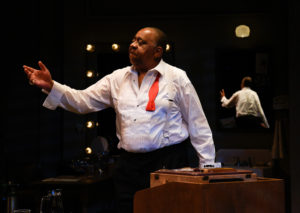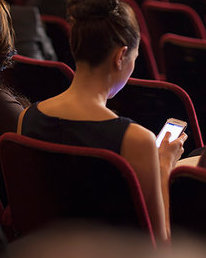The first public preview of Palm Beach Dramaworks’ production of Satchmo at the Waldorf, which took place last night, went so smoothly that I canceled today’s rehearsal. With one final preview remaining before Friday’s opening-night performance, we’re a heartbeat away from freezing the show, and I’m already starting to feel a surge of prospective relief.
 One thing that went especially well was the pre-show no-cellphones announcement, which was written by me and recorded by Barry Shabaka Henley, the star of Satchmo. It’s a show-specific variation of the all-purpose announcement that I published three months ago in a Wall Street Journal “Sightings” column called “How to Stop Theater’s Cellphone Scourge.”
One thing that went especially well was the pre-show no-cellphones announcement, which was written by me and recorded by Barry Shabaka Henley, the star of Satchmo. It’s a show-specific variation of the all-purpose announcement that I published three months ago in a Wall Street Journal “Sightings” column called “How to Stop Theater’s Cellphone Scourge.”
I was seated on the extreme right-hand side of the house as it played for the first time, and I could see that everyone in the audience took in what Shabaka was saying—and acted on it. Not a single cellphone rang or was otherwise used during the ninety-minute performance that followed.
For the benefit of anyone who is grappling with the problem of how to get theater patrons to turn off their cellphones, I reprint below the relevant portion of my column. I’ll let you know whether it’s similarly effective at future performances of Satchmo, but as of now, I think maybe we’re onto something.
UPDATE: For a progress report on the efficacy of this announcement, go here.
* * *
Yes, cellphone abuse has reached pestilential proportions, but everybody in the profession privately admits that existing announcements, be they clever or straightforward, do next to nothing to reduce it. Why? Because the announcements aren’t made in such a way as to seize the attention of playgoers and persuade them to change their ways. Instead, they’re either cutesy-pie or pro forma, both of which signal that they needn’t be taken seriously.
Unfortunately, Patti LuPone’s widely reported in-your-face technique of shaming errant cellphone users by singling them out from the stage doesn’t seem to work any better. That doesn’t surprise me. Instead of insulting them, the trick is to get their attention—and get them on your side….
 • First, get the audience’s attention by lowering the house lights. Then make the announcement, either live from the stage or, even better, in the form of a video projected in front of the curtain. Either way, it must be loud enough to cut through the pre-show chatter. It should also be made in a listen-up-folks manner, not in the blandly cheery tones of the pre-recorded safety messages that air travelers habitually tune out.
• First, get the audience’s attention by lowering the house lights. Then make the announcement, either live from the stage or, even better, in the form of a video projected in front of the curtain. Either way, it must be loud enough to cut through the pre-show chatter. It should also be made in a listen-up-folks manner, not in the blandly cheery tones of the pre-recorded safety messages that air travelers habitually tune out.
• If the announcement is pre-recorded, it should be made by the star of the show.
• Avoid passive boilerplate language like “Please refrain from using cellphones during the performance.” Use plain, direct words—and explain why it’s in everybody’s own interests to turn off their phones.
• At the end of the announcement, pause for 30 seconds to give everybody time to turn off their phones before the show starts.
Here’s what I have in mind:
“Hello, everybody. I’m John Doe, the star of ‘Hamlet,’ and I need your help during tonight’s performance. Right now, before we get started, I want you to take out your cellphone…turn it off…and leave it off during the show. Don’t answer calls, don’t take selfies, don’t send texts. This is important, not just for me but for you.
“You may not know it, but whenever anyone uses a cellphone, I can see it up here on stage, and so can everybody else in the theater. Even if you don’t talk on the phone, it still lights up your face. That’s distracting to the people around you—and it’s distracting to me, too. It makes it harder for me to concentrate, and it might even cause me to forget my lines.
“I know your tickets cost a lot. So if you want to get your money’s worth, you should check—right now—to make sure your phone is off. Remember: No calls, no pictures, no texts. Do it for me, for your neighbors, and for yourself. Thank you very much.”
